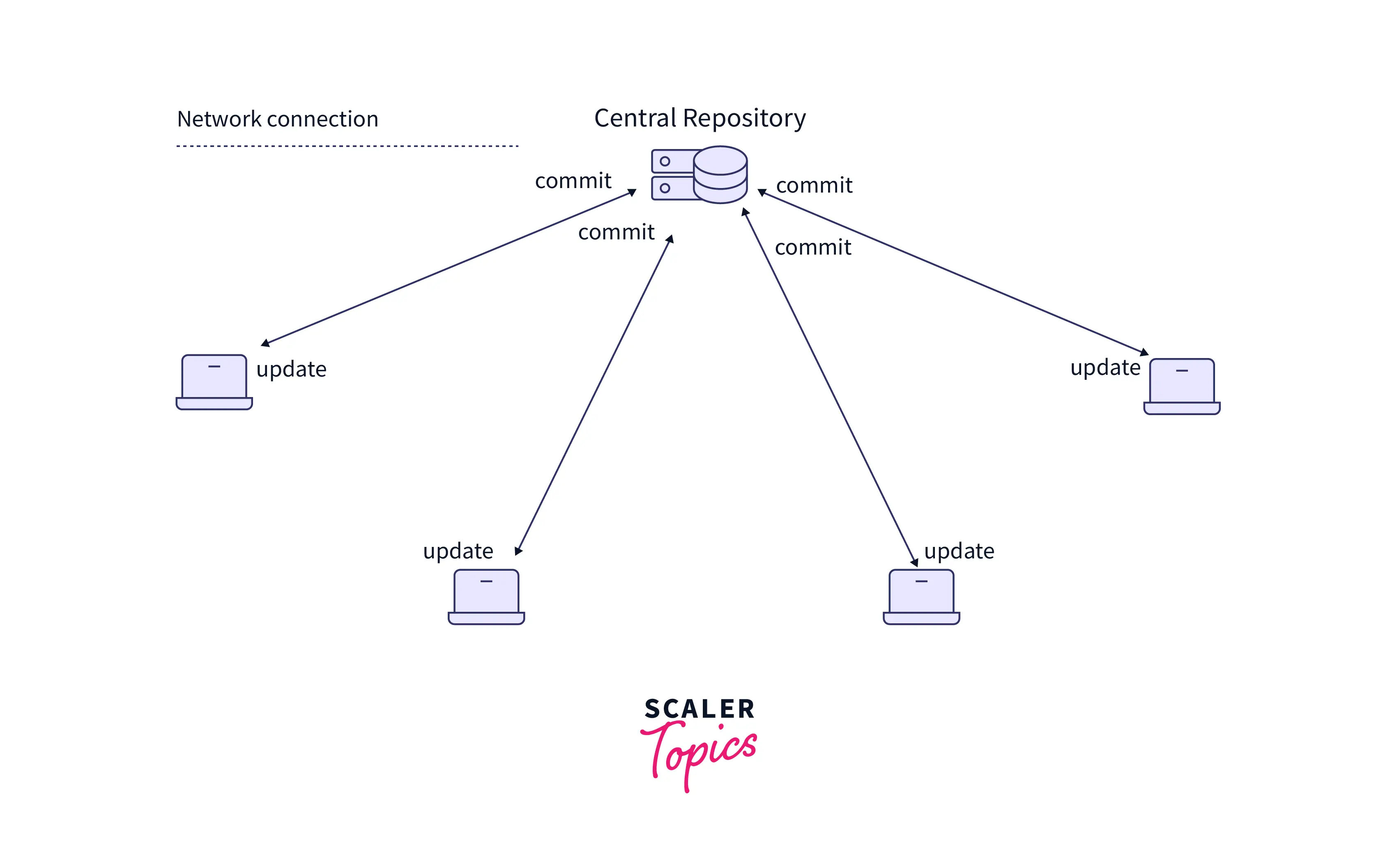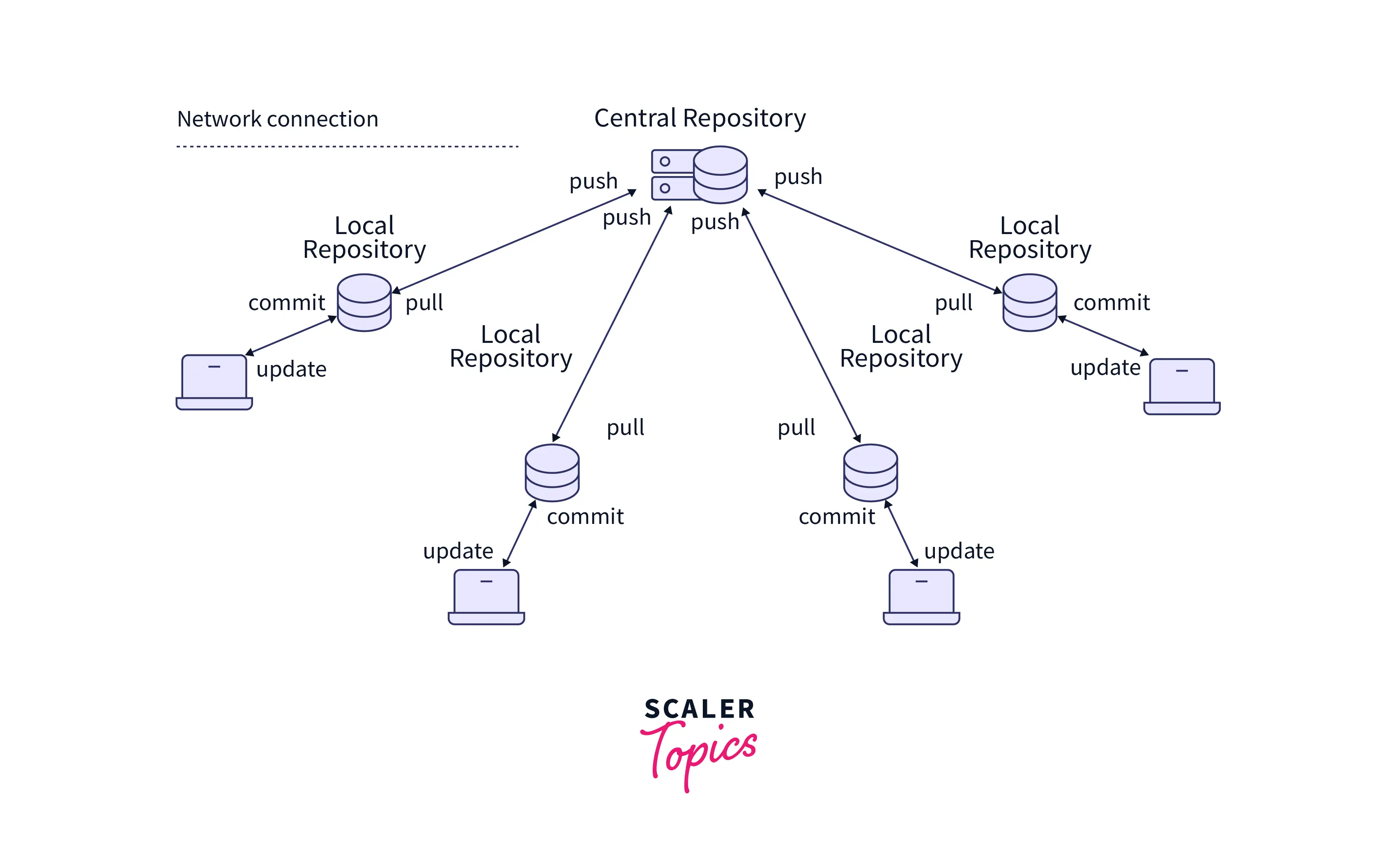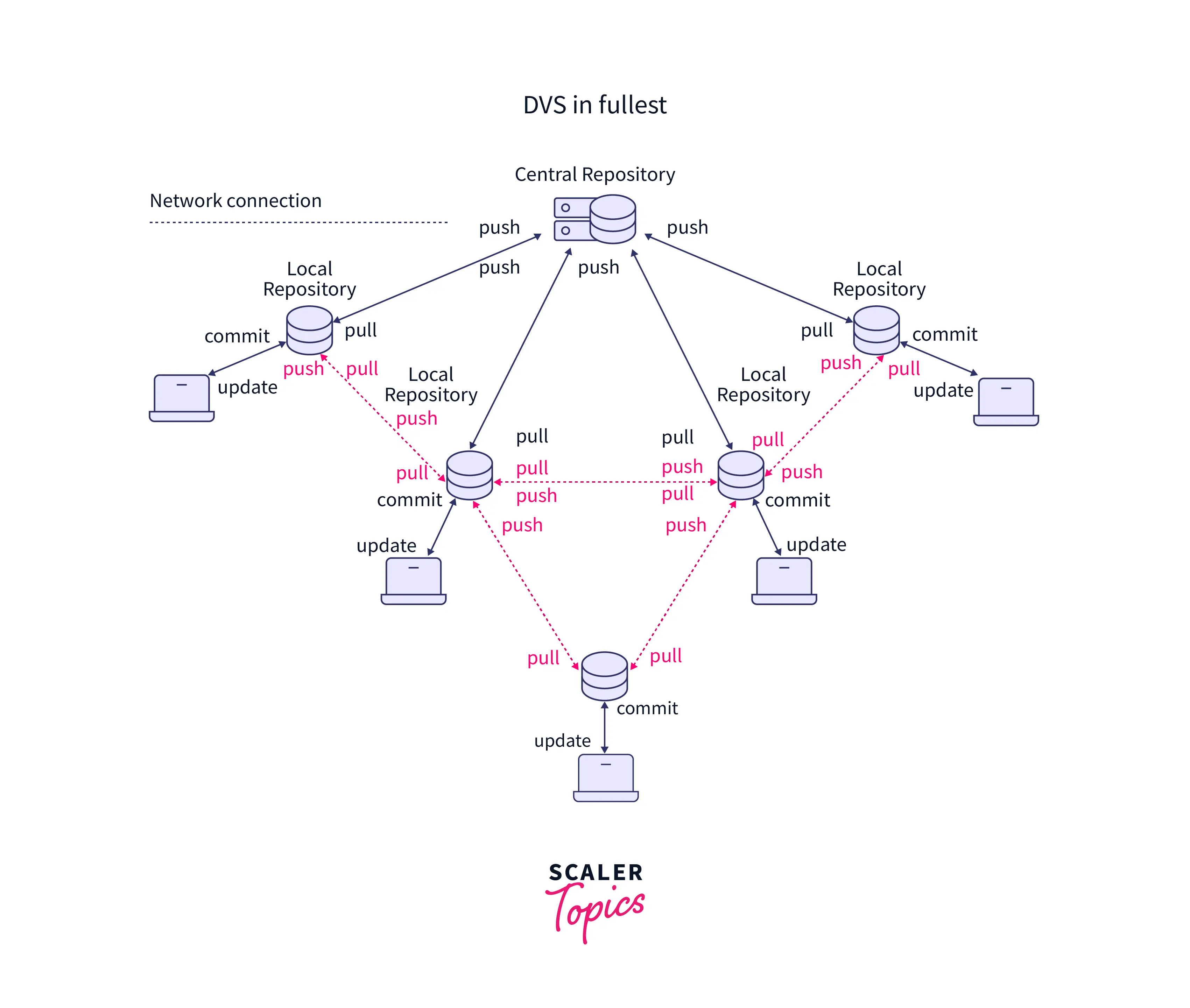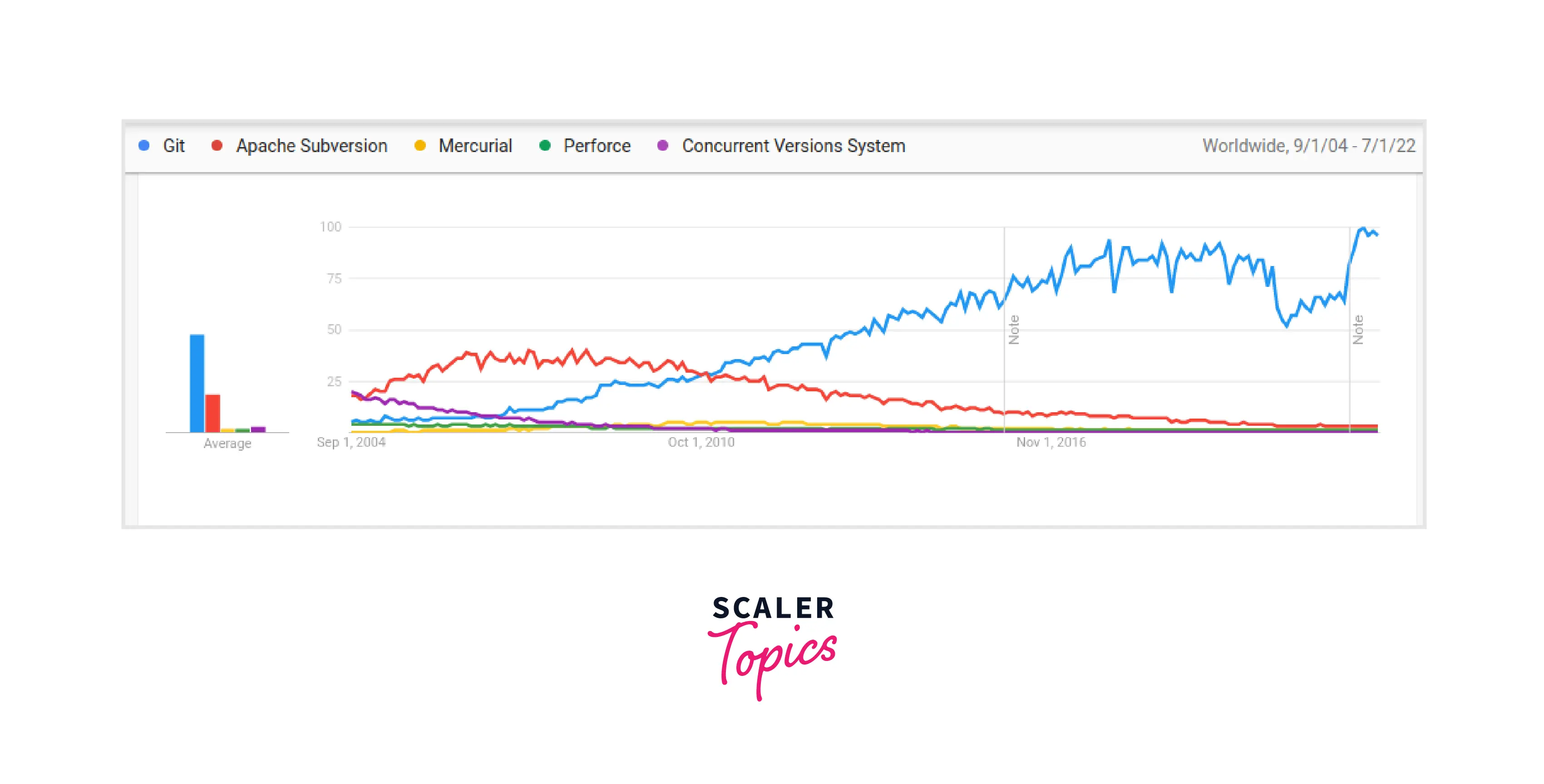Version Control System
Overview
Version Control is a very crucial aspect of Software development. Version Control Systems such as Git, Mercurial, SVN, etc., have played a major role in developing various software. Version control systems offer much more than just tracking the file history. Version Control Systems are mainly categorized into two types Centralized and Distributed Version Control Systems. Git is the most popular and widely accepted distributed version control system. This article covers both of them in detail. So without further ado, let's begin.
What is Version Control?
To discuss "version control", firstly, we need to know the meaning of "version". What is a version? So according to a definition, "version is a particular form of something differing in certain respects from an earlier form or other forms of the same type of thing". This simply means that a form of something with some modifications leads to a newer version of that thing. If I were to tell you the most suitable example of a version, in my opinion, it would be none other than an example of a mobile application that we regularly use in our day-to-day life, such as WhatsApp, YouTube, etc.
If you have created a project, say a web-based application or any project, you might have created a file named final, latest, or the latest news, and then you might have added dates to the name to avoid confusion. These files with updated modifications are nothing but different versions of your project. Nowadays, almost every application launches new versions every few days, such as WhatsApp, YouTube, etc., that we install from the play store, app store, etc.
Now that we know what a version is let us move towards version control.
Imagine a situation where you are a developer, and you have version 1.0 of your application running live and getting used by the users. Now you have found some bugs in the application, and you came up with another version, say Version 2.0, and you released this version. After releasing the latest version, you learned from the users that your application is not running at all, or, in other words, it's Down. What would you do? You would try your best to solve the problem immediately, right? What if you already had a copy of the previous version that you could easily switch to when encountering a problem? Here comes the term "Version Control" into the picture. Version control refers to the condition where we can control various versions hassle-free. How? Using VCS or Version Control System.
A Version Control System(VCS) is a system that gives users the facility to track various versions of the application hassle-free. The most popular Version Control System is Git which has captured a huge market of Version Control Systems.
Note: Version Control System(VCS) is also known as Source Control Management(SCM) tool or Revision Control System(RCS).
Benefits of Version Control Systems(VCS)
We have already seen the definition of Version, Version Control, and Version Control Systems. Now let us have a look at some benefits of Version Control Systems.
Best Practice
Version Control Systems are considered one of the best practices in the industry. Due to its benefits, almost every developer uses version control systems while developing an application or working on any application.
Change History
VCS keeps the whole change history of the file, be it of today or the previous year. This not only helps in looking over the changes made previously but also helps in learning from the mistakes made previously.
Branching and merging lead to Acceleration.
VCS has a branching and merging facility which leads to more accelerated growth in the development of an application. Every developer can work separately on an independent branch without changing the main branch. This also helps in the well-maintained distribution of various features development and their maintenance.
Traceability
Traceability is a great feature of Version Control Systems due to its significance. Tracing the changes gives many details, such as who made the changes and when and why the changes were made. Each of these details can be fetched using the Version Control Systems traceability feature.
After the change is traced, it can be connected to the project management and bug-tracking software such as ClickUp, LogRocket, JIRA, etc. This accelerates the development process and helps keep a record of all the changes with a proper description of the change, like the reason for that change, etc.
Reduced Risk
This is an obvious benefit of Version Control Systems. Since the companies, or particularly developers, have complete change history and versions of a file, the risk of version loss gets reduced to a great extent. This plays an important role in keeping the application always running. In case of a version failure, switching back to the previous version becomes seamless.
Efficient Collaboration
There can be several teams working simultaneously on one application. Hence it is necessary to have an efficient collaboration system that allows team members to collaborate seamlessly. Version Control Systems makes such efficient collaboration possible as teams worldwide can work on the application simultaneously and work on newer versions without the fear of missing the current version. (as discussed in Branching and merging section)
Hassle-free Software Development
All the points discussed above, such as Best Practice, Change History, Branching and Merging, Traceability, Reduced Risk, and Efficient Collaboration, lead to hassle-free software development, which is necessary for this fast-paced software development environment.
Types of Version Control Systems(VCS)
Version Control Systems are mainly divided into four categories. Each of these categories has its advantages and disadvantages, making them unique and powerful in their own way. Let us have a brief look at these categories and their distinct applications.
Centralized Version Control System(CVCS)

The term Centralized Version Control System is self-explanatory. In this type of VCS, a central repository holds all the files of the project and the users(here developers) work on the working directory on their personal computers. To be more specific, the developers make the changes(or updates) in the working directory and then commit the changes directly to the central repository. It's simple but not so efficient when it comes to the development and maintenance of complex projects and applications.
Some of the challenges faced by the Complex Version Control Systems are:
-
High Risk of repository loss or data loss.
The most dangerous challenge faced by the CVCS is Repository loss. In CVCS, there's only one central repository where all the information is stored, and users(developers) have only the working directory in their system and not a copy of the whole repository. This increases the risk of loss or data loss as once the central repo is lost, none of the developers can access it, and all of the work done before gets lost in the blink of an eye.
-
Lack of Efficient Collaboration and High risk of merge conflicts
As developers make the changes in the working directory and commit them directly into the central repository, the risk of merge conflicts becomes very high. For example, Developers A and B work on the same working directory and made such changes that can create issues if applied together. In such situations, a merge conflict will likely occur. This creates unnecessary problems. Apart from this, In CVCS, collaboration is not that efficient as developers don't have the whole repository. Team members usually work on a specific part of the project; hence they require that repository to test the feature (or change) before making it live on the whole project.
The solutions to these problems are discussed in the next section of Distributed Version Control Systems.
Distributed Version Control System(DVCS)

The term Distributed Version Control System is also self-explanatory. In Distributed VCS, there is a central repository, and developers can also have that whole repository in their local system. Hence, for any change, firstly, the developers make the change in the local repository and test it; then, if the team decides to make it live, it is committed to the central repository.
The challenges faced by the Central Version Control Systems are solved in Distributed VCS:
-
Reduced Risk of repository loss or data loss. Here also, the central repository is only one, but its copies are stored on many developers' local systems, which reduces the risk of Repo loss to a very large extent. Suppose that due to some system failure or technical issue, the central repository gets broken or all the data vanishes, but as it's a Distributed VCS, the data can be recovered from any developer's local system; amazing, right? This is one of the reasons why "Distributed Version Control Systems" have gained much popularity among developers and organizations.
-
Efficient Collaboration and low risk of merge conflicts Since every developer can have his copy of the central repository on his local system, the tasks can be easily distributed among the teams as they can work on a specific piece of code without worrying about the other team's collaboration. They can easily test their modifications on their local machines, and if they find them successful, they can push the modifications to the central repository from the local one. This results in seamless collaboration and a low risk of merge conflicts as each team have a different copy of the central repository.
Illustration: Full-fledged

In the above-given illustration, it can be observed that distributed Version Control System not only helps developer to Central repository communication but also helps in dev-to-dev repository communication. This helps streamline development, resulting in fast-paced product/feature launches.
List of Distributed Version Control Systems(DVCS)
There are many distributed Version Control Systems in the market, but here we will see the two most popular. As per the Google Trends report, one of them is way more popular than the others.

Let us have a brief look over them.
1. Git
Git is the most popular, free, and open source Distributed Version Control System out there. With remarkable community support, Git has captured a huge Version Control Systems market. In addition, Git has an internet hosting service for software development and version control called GitHub. Simply put, GitHub is a host for all the repositories of Git.
2. Mercurial
Mercurial is a free and open source Distributed Version Control System that efficiently handles projects of any size and provides an easy and intuitive interface that makes it very simple to learn, especially for beginners. Talking about the features, it offers almost all the major features that are offered by Git. Apart from this, it is fast and powerful and claims to have a lot of features for power users.
Which is the Best Version Control Software?
As far as software development is concerned, Distributed Version Control System such as Git is mostly preferred over Centralized Version Control Systems such as SVN for the reasons we discussed earlier in this article.
Conclusion
- Version Control System(VCS) is a system that gives users the facility to track various versions of the application hassle-free. The most popular Version Control System is Git.
- Version control systems offer much more than just tracking the file history.
- Version Control Systems are mainly categorized into two types Centralized and Distributed Version Control Systems.
- Git is the most popular and widely accepted distributed version control system.
- Some benefits of Version control systems include Complete change history, Traceability, Reduced Risk, Efficient Collaboration, and much more.
- Two most popular Distributed Version Control Systems are Git and Mercurial.
- A popular Centralized Version Control System is SVN.
- Distributed Version Control Systems such as Git are mostly preferred over Centralized Version Control Systems such as SVN.
